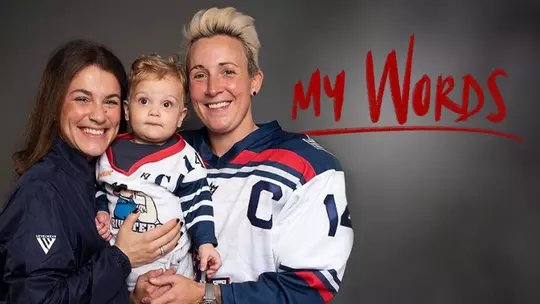
My Words: Life is a beautiful place
By Madison Packer, Women's Hockey ('14)
6/13/2022
WARNING: The following content contains depictions of suicide which some readers may find disturbing.
Reader discretion is advised.
I made the worst decision of my life on a cold, snowy December night in 2014.
I was a few days away from graduating from the University of Wisconsin with a degree in English studies. My parents and three siblings were preparing to travel from our home in Birmingham, Mich., to join me for winter commencement. A significant chapter in my life was about to come to a close and it seemed like a time for celebration.
I had spent 4½ life-altering years in Madison playing forward for the UW women’s hockey team, skating with legends like Brianna Decker, Meghan Duggan and Hilary Knight. I played in two NCAA title games and won a championship ring as a freshman. I was an assistant captain as a senior. I finished my 146-game college career with more than 100 points and made lifelong friends along the way.
I had a lot to be grateful for, a lot to be proud of from my time as a UW student-athlete. As my favorite author, Ralph Waldo Emerson, would say, “Make the most of yourself for that is all there is of you.”
Then why did I feel so desperate and alone?
Why was I in so much pain? Why was I so miserable?
Why was I standing on a chair on the balcony of my campus apartment, looking out over the railing to the ground 15 stories below, thinking long and hard about doing the unthinkable?
“What if I just jumped?” I asked myself.
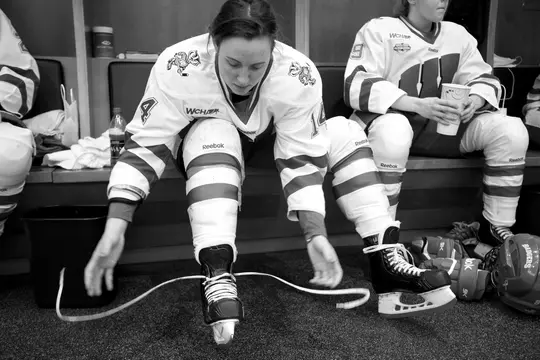
I stood out there in the cold for several minutes, measuring the weight of the situation. I had been drinking. It was around 9 or 10 o’clock when I temporarily came to my senses.
“My God, you’re crazy,” I told myself as I went back inside.
I felt restless, so I grabbed my car keys and went for a drive that I hoped would clear my head. I didn’t have a plan or a destination, but I was out of the city when this debate began in my head. Part of me thought about that moment on the balcony and how outrageous and irresponsible it was. But there was another part of me that thought had I gone through with it and jumped, my troubles would all be over and I wouldn’t have to feel this way anymore.
The next thing I knew I was pressing my foot on the gas. The car accelerated, then swerved hard into one of those concrete pillars under an overpass. I remember someone coming to the window of my totaled car to see if I was OK. I don’t recall the ambulance ride to UW Hospital. I woke up with cuts, bumps and bruises, but no serious injuries, at least on the outside.
Why would I do such a thing?
It’s complicated.
I don’t ever want someone else to be in my situation. To be standing on a chair on a 15th-floor balcony thinking life is over at 22. There’s so much help out there and there are people who care. You don’t have to have a diagnosed mental health disorder to struggle with depression. You don’t have to get to a point where you feel there are no options to realize you need help.Madison Packer
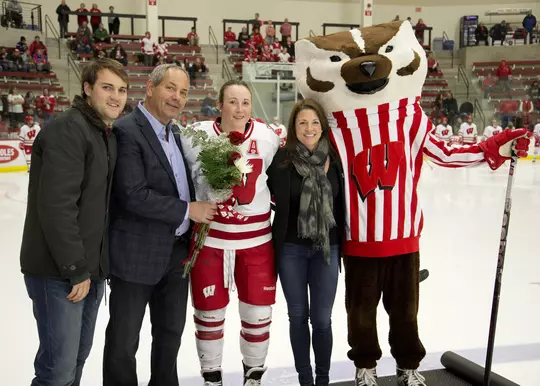
I had been very depressed for about four months. I’d gone through a really bad breakup. It felt like my whole world was imploding. It was a struggle to get out of bed in the morning. I lived by myself, so I was very lonely. I wasn’t on the team anymore, so I didn’t have that group of people around me every day for motivation and support. A lot of the teammates that had been in my class had already graduated and moved on.
The idea of graduating, leaving Madison and losing touch with the LGBTQ+ community on campus was particularly unbearable. We had such a good culture within the UW athletic community where everyone knew who everyone was. We had athletes on almost every team – men and women – who identified as gay. We all kind of protected each other and we respected that not everyone was living their truths. It was easy to be part of a community where you felt accepted and protected.

As I tried to figure out what I was going to do with my life after leaving UW, I felt like I didn’t have any support and I didn’t have the concrete answers that everything was going to be OK. I was staring at this giant world where, for the first time in my life, I didn’t have someone telling me where to go and what to do. I didn’t have to get up and go to a gym for anything. It was terrifying. That day I was thinking, “I can’t do this. I’m not playing hockey anymore. I’m not happy. What am I going to do with my life?”
Deep down, I didn’t want to do what I did. I just felt like I didn’t have any other options.
I spent two days in the hospital and was voluntarily admitted to the psych ward for 48 hours. I’ll always be grateful to Paul Hickman, the director of women’s hockey operations at the time, for coming to the hospital and helping me navigate that moment. I’m also thankful to athletic trainer Denny Helwig and assistant coach Dan Koch, who took the time to listen to me.
There’s a lot of guilt in what I did. It really destroyed my family for a while. It was really hurtful to a lot of people around me because everyone thinks, “How could you be that selfish?”
I learned that when you get to that space mentally, you’re not thinking about anything else. You aren’t thinking about anything but yourself and your pain and the fact you want to feel normal and happy. That’s why depression is a disease.
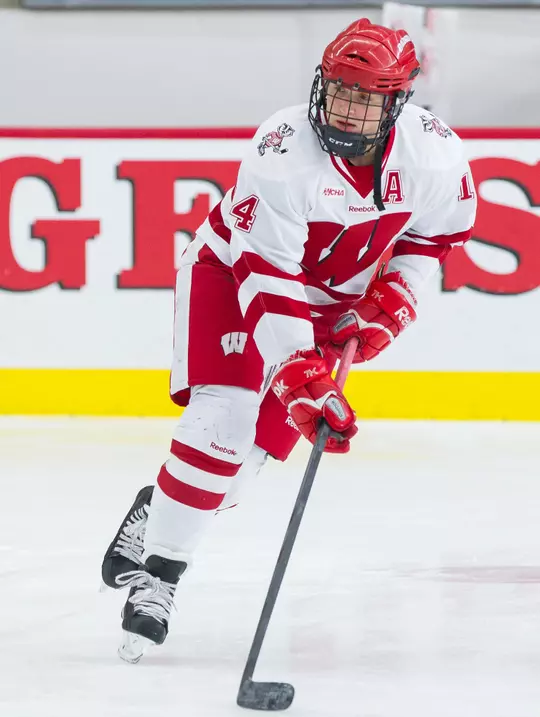
Fast forward to today. I’m living my best life and loving every second of it. I love my life now. I’m happy I’m here and I couldn’t imagine my family going on without me. But you don’t think about that when you’re in that moment.
The hardest part for me was trying to explain to my family – father Greg, mother Laura, brothers Spencer and Bennett, and sister Daryn – that it wasn’t anything to do with them and trying to heal those relationships. It’s something I’m still working on with my younger brother Bennett. This has affected him deeply. It’s maybe my biggest regret in this life that I didn’t consider the impact on him and the whole process.
In the aftermath, there’s a lot of guilt felt by the people around you. No one knows what to say. They feel like they should have done something differently. There’s an awkwardness about how to move forward and a fear of the unknown regarding the future.
The events of that December night nearly eight years ago made me realize the hard way that I had a lot of people who really care about me. They just didn’t know what was going on inside of me. I was afraid to admit that something was wrong. I didn’t know how to ask for help. I was embarrassed to admit that I was struggling with depression. Had I reached out to some of those people, I would have found that I did have support and I did have outlets and I did have answers available for the asking.
I felt I was dealing with this thing totally on my own because no one was talking about it. I thought there was something wrong with me because everyone around me seemed happy and fine. I wish someone had talked about it and made it clear that it was OK to feel the way I did and that I wasn’t alone.
It’s become painfully clear to me that we don’t talk enough about mental health and it’s imperative that we start addressing that. Everyone understands the struggle in some form or knows someone going through it. The more we can normalize the conversation around it, whether you’re an athlete or a school teacher or whatever, the better.
I don’t ever want someone else to be in my situation. To be standing on a chair on a 15th-floor balcony thinking life is over at 22. There’s so much help out there and there are people who care. You don’t have to have a diagnosed mental health disorder to struggle with depression. You don’t have to get to a point where you feel there are no options to realize you need help.
When I first agreed to tell my story, I didn’t intend to share this part of my life. I’ve never revealed this part of my journey with anyone publicly. I was going to focus on Pride Month and what it means to me, my wife Anya and our growing family.
But it’s become painfully clear to me that we don’t talk enough about mental health and it’s imperative that we start addressing that. Everyone understands the struggle in some form or knows someone going through it. The more we can normalize the conversation around it, whether you’re an athlete or a school teacher or whatever, the better.
I’ll never forget how jarring it was for me when a hockey teammate of mine in high school took her life in 2009. Dozens of college athletes in the last year have done so as well, including one at Wisconsin. I think the hardest part is the aftermath of it all. Communities of kids crushed by losing teammates and families devastated because they’ve lost a loved one. My family was fortunate, but they had to deal with the short-term implications.
There’s a different kind of mental pressure on college student-athletes. If you’re on scholarship at UW, you’re likely a career athlete up to that point because you have to have set yourself apart from the rest. You’re constantly consumed by honing your craft. Then you go to college and while you have classes, your priority is being an athlete. Your scholarship is what’s paying for you to go to school. It becomes your purpose.
We’re treated like gold at Wisconsin and that’s incredible. I wish all student-athletes, especially female, were treated like we are there. You don’t stop to realize that’s not the real world. The NHL guys joke that they get treated way better at UW than they do on their pro teams.
If you’re a student-athlete at Wisconsin, you have purpose and structure in your life that then disappears when your eligibility runs out. You have developed all these incredible time management skills because you have to in order to survive, but then you’re left with all this time on your hands when you’re done. All of a sudden, you’re staring down this road of where to go. You’re going to graduate and go out into a world that you know little about. You can never be fully prepared for that, but we don’t talk about it enough.
I spoke with a therapist not long ago who said mental health is going to continue to be a major problem. “We’re living in a crisis with your generation and the ones to follow,” she said. “You’re all used to the concept of instant gratification. With the click of a button you can have whatever you want. You want things fixed immediately. Suicide is a permanent solution to a temporary problem.” I think about that all the time.
After graduation, I went back to Michigan and tried to figure out what to do with my life. I completely removed hockey from the equation. I started talking to a sports psychologist and really took a step back from being a hockey player named Madison to being Madison who also happens to play hockey. That was a huge weight that was lifted off me because there were so many other aspects of my life that I felt like I had to hide. I couldn’t be who I was and live in a happy space because I always wondered how being gay would impact my hockey opportunities.
When I came out to my family and met my wife in 2017, I began to live openly as a gay person. It was like giving me permission to breathe. I didn’t realize that I was living this sheltered life, but not fully enjoying it. Being open and honest and feeling like I could be who I was has created so many opportunities for me.
Since leaving Madison, I’ve played pro hockey for the Metropolitan Riveters, based in Newark, N.J., in the Premier Hockey Federation. I just signed a new contract that will carry through to 2024. I also work for an executive search firm, lining up executives for tech companies around the world.
Four years after the lowest moment in my life I experienced the highest of highs when I married Anya. She’s incredible. She’s a bubbly, exuberant, confident, outspoken person who’s very different from me. She says what’s on her mind, but not in a confrontational way. She lives authentically.
Life is a beautiful place when you live your truth.
When we got married, I realized that I had so much to be grateful for. I couldn’t fathom how much my life had changed from that day in Madison. Being with her I realized the importance of loving myself, that it’s not selfish to put yourself first and you’re not being yourself if you’re not taking care of yourself. You have to love yourself and know who you are and be confident in who that person is before you can consider loving somebody else. I never understood that or knew what it meant until I was with her. It’s changed my entire outlook on life. We have a son named Waylon, who was born in 2020, and we’re due to have a girl in September.
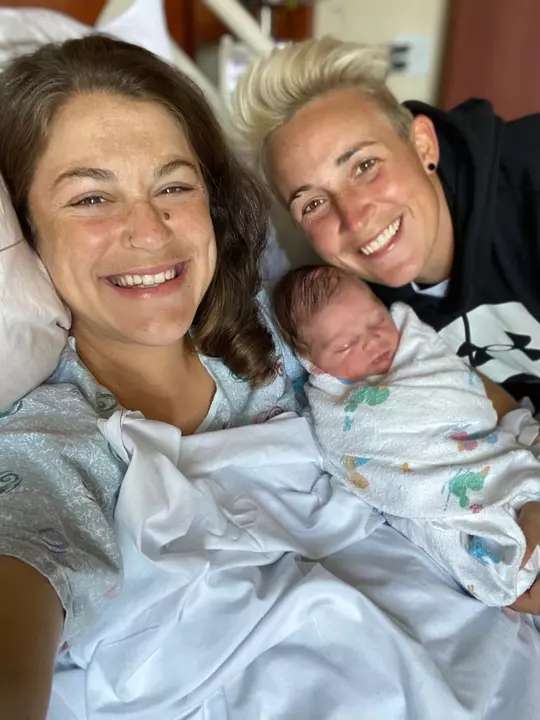
Being happy day-to-day isn’t a struggle for me anymore, but it took a lot of work to get there. It took a lot of work to be confident in who I am. I struggled for a long time with my sexuality and how that would be viewed by my family and the public and what life would look like.
One of the reasons I became more comfortable in my role as an advocate is that Anya, who works in cybersecurity and tech research, speaks openly about her mental health struggles, her hospitalization and her diagnoses. Ten years ago I never would have stood up and talked to people about mental health or gotten in front of a group of trans youth and talked about my journey as a member of the LGTBQ+ community. Now I do it all the time. I didn’t realize how it all connected me to so many people who really needed someone in their communities to speak up and to feel like they had someone with a platform who was advocating for them. Everywhere I go there’s almost always a kid coming up to me and saying thank you for sharing my experiences.
I started keeping a journal in 2009 after I lost my teammate to suicide. A sports psychologist encouraged me to write something every night before I go to bed to try and clear my head. I think I’ve collected 3,000 to 4,000 quotes and motivational thoughts over the years. It’s therapeutic. Emerson has long been one of my favorites.
Here’s a good one: “To be yourself in a world that is constantly trying to make you something else is the greatest accomplishment.”
Here’s another: “Our greatest glory is not in never failing, but in rising up every time we fail.”
I’ve been writing lately about life. Becoming a parent changes your perspective in a big way. All of a sudden, things you didn’t consider before have become really important and things you thought were the center of your universe didn’t really matter at all.
I share my story today with one thing in mind: Hope. I hope that those reading will recognize that we need more love and empathy in our ever-changing world. I hope that those struggling will find peace in knowing there are answers and resources available. I hope we finally realize that mental health matters regardless if it’s in a classroom, arena, small town or big city.
To anyone out there struggling, feeling unheard or alone, know that you are not. You deserve happiness. You are deeply loved. You don’t have to live your life suffering in silence. The road you’re on is paved with people who will get you through. Life is a beautiful place when you live your truth.
“Nobody can bring you peace,” Emerson said, “but yourself.”

MENTAL HEALTH RESOURCES
- If you or someone you know has a mental illness, is struggling emotionally, or has concerns about their mental health, there are ways to get help. Use these resources to find help. https://www.uhs.wisc.edu/prevention/suicide-prevention/mh-resources/
- In case of a mental health crisis, call the UW-Madison campus 24-hour crisis number: 608-265-5600, option 9.
- National Suicide Lifeline: 800-273-8255
- Trevor Project Lifeline: 866-488-7386
- If you or someone you know is experiencing a life-threatening emergency, call 911 or go to the nearest Emergency Department

